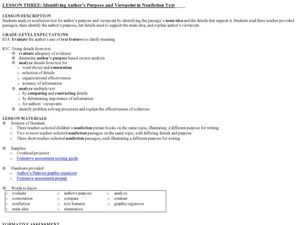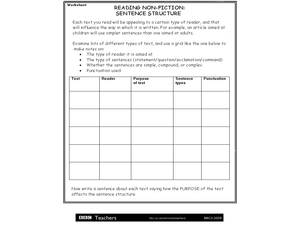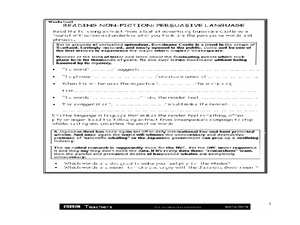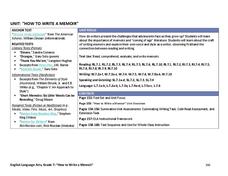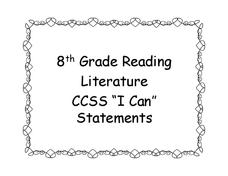Curated OER
Compare and Contrast Nonfiction Texts
Explore nonfiction writing by comparing and contrasting two different texts. After reading two nonfiction books, articles, or magazines, students utilize a graphic organizer to record their similarities and differences. They answer study...
Curated OER
Identifying Author’s Purpose and Viewpoint in Nonfiction Text
Why do people write books? Pupils discover how to identify the author's viewpoint. They read non-fiction passages their instructor selects (the plan has the class look at nonfiction children's picture books), and then identify the...
Curated OER
Analyzing Nonfiction Text Elements - Editorials
Examine the text features of non-fiction. Start the lesson by reading editorial samples provided by their instructor and analyze the texts for word choice, details, and organization. An editorial example and graphic organizer are...
Curated OER
Reading Non-Fiction: Sentence Structure
Use this worksheet to help make explicit the connection between sentence structure, audience, and author's purpose. Readers track and find patterns in sentence structure in various nonfiction texts, and connect it to the purpose of the...
Curated OER
Civil Disobedience from Antigone to Hunger Games
Study the concepts and practice of civil disobedience through fiction and nonfiction texts.
Curated OER
Comparing and Contrasting Fiction and Nonfiction Using Graphic Organizers
Students compare and contrast fiction and non-fiction selections. In this writing skills activity, students use different forms of graphic organizers to compare "The Three Little Pigs," to Wiesel's Night.
Curated OER
Irony in Poetry and Prose (Fiction and Non-fiction Texts)
Middle and high schoolers examine the impact of irony in poetry and prose. For this figurative language lesson, they read instructor-selected literature and identify uses of irony. Then they discuss how irony enhances literature.
Curated OER
Creating a Science Fiction Story
As the culminating activity in a unit study of science fiction, young writers demonstrate their understanding of the genre by producing their own graphic novel. After deciding on the main elements of their story, individuals use a comic...
ReadWriteThink
"Three Stones Back": Using Informational Text to Enhance Understanding of Ball Don't Lie
"Three Stones Back," a passage from Matt de la Pena's best-seller, Ball Don't Lie, allows readers to practice their close reading skills as they compare the passage to an information text about wealth inequality.
Curated OER
Historical Agency in History Book Sets (HBS)
Study historical events by combining the study of historical fiction and non-fiction. Learners read about true past events in historical fiction novels and then research non-fiction accounts of the same events. What are some differences...
Curated OER
Identify Text Features in Nonfiction
What does a non-fiction text look like? Examine the text features of non-fiction. Middle and high schoolers read non-fiction passages provided by their instructor and analyze the texts for word choice, details, and organization.
Curated OER
The Purpose and Power of Persuasion
Examine the power of persuasion and have learners consider how it influences events in their own lives. After reading and analyzing informational texts to understand the author's purpose, class members take a written test and craft a...
Avi Writer
Crispin: The End of Time
Crispin: the End of Time is the core text for this teaching guide, a valuable resource for those who use Avi's trilogy as whole-class reading, in book circles, or as independent reading.
PBS
To Kill a Mockingbird Teacher's Guide
If you're planning a unit on To Kill a Mockingbird by Harper Lee, don't pass this resource by! It includes thorough discussion questions and vocabulary from the novel, research opportunities, and writing prompts to extend learning...
Curated OER
Sound Devices in Poetry, Fiction and Nonfiction
Young scholars examine the impact of sound devices in poetry. In this poetry instructional activity, students read the listed poems and identify uses of alliteration, repetition, consonance, rhythm, rhyme, and slang. Young scholars...
Curated OER
Reading Non-Fiction: Persuasive Language
In this persuasive text worksheet, students read an excerpt from an advertising leaflet and identify the persuasive words and phrases used in the text. Students then read the text about a Greenpeace campaign to identify emotive language.
Curated OER
Phineas Gage: Concept Analysis
Prepare for teaching Phineas Gage: A Gruesome but True Story About Brain Science with this written analysis of the book. The analysis includes a summary, considerations for teachers, project ideas, and a list of additional resources that...
Louisiana Department of Education
Fahrenheit 451
In his 2013 introduction to Fahrenheit 451, Neil Gaiman states, “Fiction is a lie that tells us true things, over and over.” In this extraordinary unit plan, readers "explore the power of written language to educate and influence...
Louisiana Department of Education
How to Write a Memoir
Who are we and what shapes our identities? Seventh graders work to answer this question as they learn how to write a memoir. Full of non-print resources and supplemental texts that range from fiction to non-fiction, scholars write their...
Curated OER
Identifying the Theme in a Story
Students recognize Theme through the use of simple, short stories. Using Pro Quest, students begin by researching the literary element, theme, and how it can be identified. They then identify the themes in Aesop's Fables and other short...
Curriculum Corner
8th Grade ELA "I Can" Statement Posters
Eighth grades can master the ELA Common Core standards! Show your learners the connection between classroom activities and assignments and the standards with this set of "I Can" statement posters. Each standard has been rewritten as an...
Curated OER
Unknown Frost Poem Discovered
What? A long-lost poem from Robert Frost? Introduce your class to a poem recently found and published from Robert Frost's personal collection. The lesson includes background information on the author, the poem itself, and a list of...
Curated OER
Kumeyaay Indians
Useful for literary analysis, citing textual evidence, or summary skills, this instructional activity about the Kumeyaay Indians would be a good addition to your language arts class. Middle schoolers read novels and summarize the...
Curated OER
Self-Monitoring Strategies and Vocabulary Games
Middle and high schoolers identify how to discover a word's meaning by exploring context clues and any pictures, diagrams, photographs, and charts that might be included. They continue this process with other examples and locate one on...



